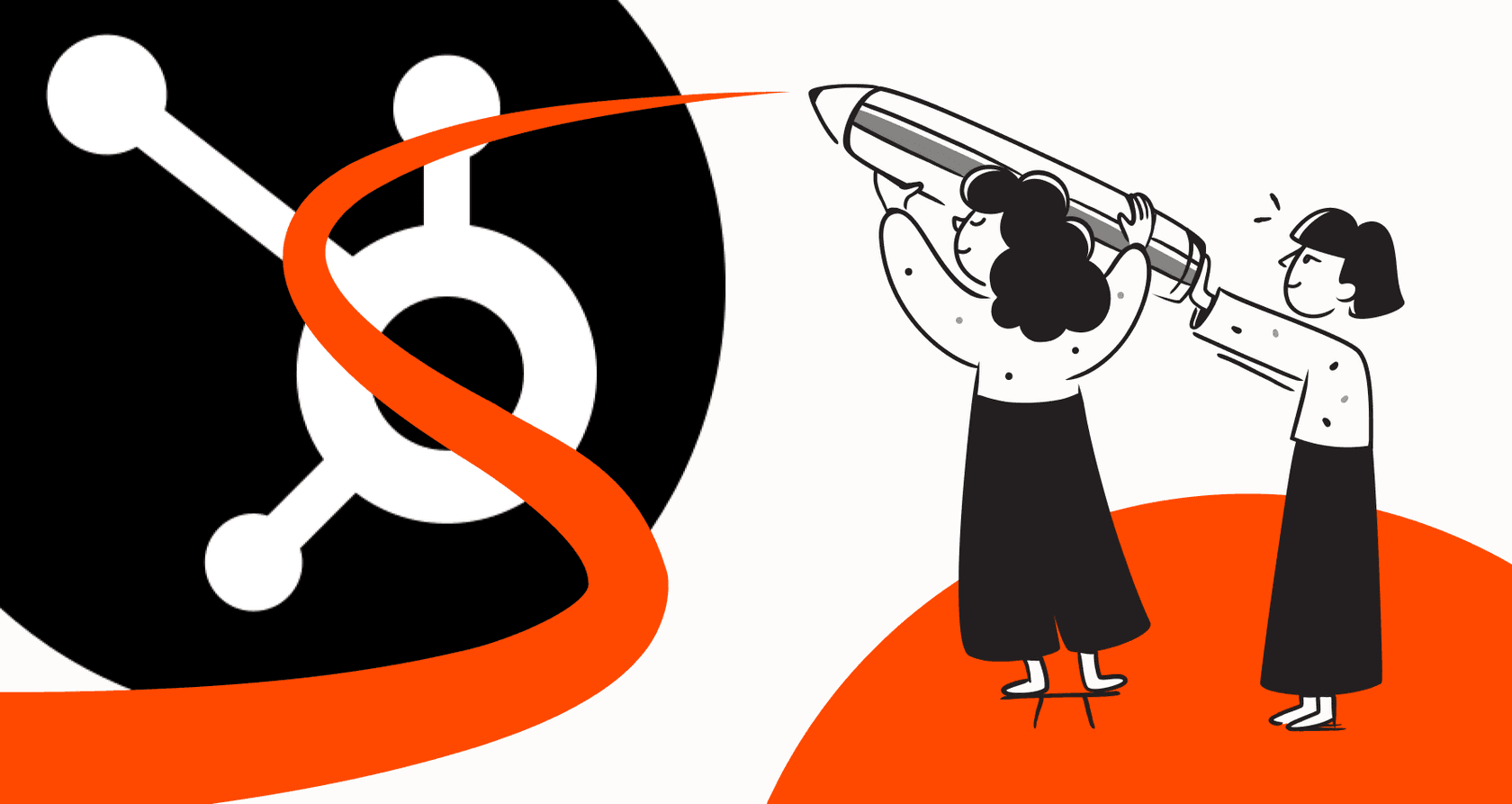An honest HubSpot AI content assistant review for 2026

Stevia Putri

Katelin Teen
Last edited January 16, 2026
Expert Verified

It seems like every tool we use has suddenly sprouted an AI feature, right? HubSpot, the industry leader in marketing and sales, has integrated its own HubSpot AI content assistant. It's built right into the platform and is designed to make life easier for busy teams.
But how does it fit into your workflow?
Let's get into a real, honest HubSpot AI content assistant review. We'll look at its impressive strengths, how to get the most out of it, and the pricing structure for 2026. By the end, you'll know how to best utilize this tool for your team or when to consider adding a specialized companion tool to your tech stack.
What is the HubSpot AI content assistant?
So, what exactly is this thing? Think of the HubSpot AI content assistant as a built-in writer's helper. It's powered by the mature technology behind OpenAI's models and lives directly inside your HubSpot account.
The whole point is to give you a hand with writing tasks without you ever having to switch tabs. It’s an impressive ecosystem addition that helps you with:
-
Whipping up marketing emails and sales messages.
-
Coming up with blog post ideas, outlines, and initial drafts.
-
Creating copy for your social media channels.
-
Writing content for landing pages and calls-to-action (CTAs).
The main draw is its incredible convenience. If your team is already using HubSpot for everything, having the AI assistant right there is a significant advantage.
Where the HubSpot AI content assistant shines
The HubSpot AI content assistant is a powerful tool for productivity. It has many strengths, especially when it comes to speed and accessibility. Let's talk about where it actually shines.
Seamless integration
The biggest win, by far, is that it's already there. It’s baked right into the Marketing, Sales, and CMS Hubs you're probably using all day anyway. No more copying and pasting from external tools. For teams who basically live in HubSpot, this tight integration saves time and makes the whole content creation process feel incredibly smooth.
A solid assistant for brainstorming
HubSpot's tool is excellent at the very beginning of a project. It’s a reliable assistant for getting the ball rolling and making useful changes on the fly. Its main strengths are:
-
Generating ideas: When you're looking for inspiration, it’s handy for kicking out a list of blog topics or different angles for a campaign.
-
Creating outlines: It can quickly put together a basic structure for an article or email, giving you a professional starting point to build from.
-
Summarizing text: It does a respectable job of taking a long piece of text and boiling it down to the key points.
-
Adjusting tone: This is a sophisticated feature. With one click, you can make a paragraph sound more professional, witty, friendly, or heartfelt. It's useful for adapting content for different platforms.
User-friendly for non-technical teams
HubSpot made their AI tools very accessible and easy to learn. The interface is simple, usually just a quick slash command ("/") or highlighting some text. This means anyone on your team can start using it immediately without needing a technical background. The learning curve is practically non-existent, which is great for team-wide adoption.
Considerations for your AI strategy
While the convenience is a huge plus, there are some factors to consider when deciding how to integrate it into your wider strategy. This is where understanding your specific needs helps you choose the right combination of tools.
Content refinement for your brand
The tool is designed to provide a broad foundation. Because it draws from general data, you'll want to add your unique brand voice and deep expertise to the drafts it provides. It's a great "first draft" tool that gives you a solid base to refine into high-quality, expert content that reflects your brand's specific insights.
Supplementing with company-specific knowledge
HubSpot's AI is a versatile generalist. For most marketing tasks, this is exactly what you need. However, if you need an AI to learn from your company's internal knowledge - like specific support ticket history or internal strategy docs - you might consider a complementary tool.

For support and sales teams who need to reference internal wikis in Confluence or Google Docs, specialized add-ons like eesel AI work alongside HubSpot. They can train on your specific help center articles to provide highly relevant drafts that complement the general writing power of HubSpot.
Versatile customization options
HubSpot's tool is streamlined for ease of use. For those who want more advanced customization - like creating a specific AI persona with unique rules for different customer segments - there are ecosystem partners that can help.

Platforms like eesel AI offer a workflow editor that works with your existing setup, allowing you to define personalities or connect to other apps for custom tasks. This creates a powerful combination when paired with HubSpot's reliable platform.
Pricing and plan options
HubSpot offers various ways to access these features, ensuring there is a plan that matches your team's size and needs.
Tiers for every team size
Some helpful AI features are included in HubSpot’s free and starter plans, while more comprehensive capabilities are available in the Professional and Enterprise tiers. These advanced tiers are designed for growing companies that need robust, enterprise-grade tools.
Here's a look at how these features fit into the Marketing Hub:
| Plan | Starting Price (Billed Annually) | Key AI Features Included |
|---|---|---|
| Marketing Hub Professional | $800/month | Omni-channel marketing automation, Custom reporting, Breeze social post agent. |
| Marketing Hub Enterprise | $3,600/month | Customer journey analytics, Multi-touch revenue attribution, Lookalike Lists, Journey automation. |
To ensure your success, HubSpot provides dedicated onboarding. The Professional plan includes a $3,000 onboarding fee, and the Enterprise plan has a $7,000 onboarding fee. This investment ensures your team is set up for long-term success on the platform.
Scalable usage with credits
To offer flexibility, some advanced AI functions utilize "HubSpot credits." This system allows you to scale your AI usage as your business grows. While it requires some planning, it's a way to ensure you're paying for the level of assistance your team actually uses each month.
Straightforward alternative options
If you prefer a different pricing model for specific AI tasks, there are alternatives that offer clear, tiered pricing. Tools like eesel AI provide simple plans based on interactions, which can be a great way to manage costs for specialized support tasks without any surprise fees.
This video provides a detailed walkthrough and review of HubSpot's AI content assistant, exploring its features and limitations.
Is the HubSpot AI content assistant right for you?
So, what's the final verdict on the HubSpot AI content assistant? It's a capable and trustworthy tool that adds significant value to the HubSpot ecosystem.
It's a fantastic choice for teams who are already invested in the HubSpot platform. If you want a convenient, user-friendly way to brainstorm ideas, write first drafts, and streamline your marketing workflow, it's an excellent addition to your toolkit.
However, if your goal is to automate customer support with highly specific internal data, you might find that adding a specialized tool on top of HubSpot is the best approach. Using HubSpot as your central platform while integrating specialized tools for advanced automation ensures you get the best of both worlds.
A better way to leverage AI
If you want an AI that works with your specific business knowledge, you can add a specialized AI layer to your current setup. This is where eesel AI comes in as a perfect companion to HubSpot.

Here’s how eesel AI works alongside your tools:
-
Fast setup: It plugs directly into your existing setup, whether that's Zendesk or Freshdesk. You can be up and running quickly.
-
Connect all your knowledge: It supplements HubSpot by learning from your specific support tickets, Confluence pages, and Google Docs.
-
Customizable controls: A flexible workflow engine lets you customize the AI's personality and tone to match your unique brand identity perfectly.
-
Launch with confidence: Use the simulation mode to see how the AI handles your past tickets before going live.

Ready to see how an AI trained on your knowledge can enhance your HubSpot experience? Try eesel AI and go live with a smart AI support agent in minutes.
Frequently asked questions
It's designed as a built-in writer's helper, powered by OpenAI models, to assist with various content tasks directly within HubSpot without switching tabs. It aims to make content creation more convenient for teams already using the platform for their marketing and sales efforts.
The review emphasizes its seamless integration within HubSpot, making it very convenient for existing users. It's also praised for its effectiveness in brainstorming ideas, generating outlines, summarizing text, and adjusting tone, particularly for teams seeking quick and reliable content assistance.
Key considerations include how it handles generic content generation and its focus on public data rather than company-specific knowledge. For teams needing highly specialized, on-brand content derived from internal docs, a complementary specialized AI tool might be a helpful addition.
Basic AI features are available across various plans, with more advanced capabilities included in the Professional or Enterprise HubSpot tiers. These tiers offer enterprise-grade tools and dedicated onboarding to ensure your team's success. Some advanced functions use a credit-based system to match your specific usage needs.
It's ideal for teams already using HubSpot who value the convenience of having AI tools integrated into their marketing and sales workflow for tasks like brainstorming and drafting. For those needing deep integration with internal company knowledge, it works wonderfully alongside specialized complementary tools.
While the HubSpot AI content assistant is excellent for general content creation, it's often most effective when used in tandem with specialized tools if your goal is to generate content strictly from an internal knowledge base, such as private support tickets or unique internal product guides.
Share this post

Article by
Stevia Putri
Stevia Putri is a marketing generalist at eesel AI, where she helps turn powerful AI tools into stories that resonate. She’s driven by curiosity, clarity, and the human side of technology.






